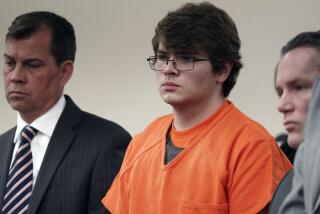Furrow to Face Federal Charges First
A federal grand jury indicted confessed gunman Buford O. Furrow Jr. on two capital charges Thursday, giving U.S. prosecutors the first opportunity to try the man accused of wounding five in the Aug. 10 attack on the North Valley Jewish Community Center and then killing postal worker Joseph Ileto.
The action means that Los Angeles County Dist. Atty. Gil Garcetti will have to wait for U.S. Atty. Alejandro N. Mayorkas to finish his case before prosecuting Furrow in the attempted murder of five, including three children, and related charges.
For the record:
12:00 a.m. Aug. 21, 1999 For the Record
Los Angeles Times Saturday August 21, 1999 Home Edition Metro Part B Page 5 Metro Desk 2 inches; 65 words Type of Material: Correction
Federal death penalty--The Times incorrectly reported in Friday’s editions that Laurie Levenson of Loyola Law School said federal courts do not require a penalty phase in trials involving the death penalty as state courts do. She said federal prosecutors do not have to prove that the murder involved special circumstances as state courts do. Federal courts do have a separate proceeding that is used for determining whether the death penalty should be imposed.
The federal grand jury indicted Furrow not only in the murder of a letter carrier “in the performance of his official duties,” but also for allegedly using a firearm to commit the slaying--in this case, a 10-shot, Model 26 Glock pistol--of Ileto as he delivered the mail. Conviction on either charge can result in the death penalty.
He also is accused of violating a law against felons carrying firearms, which carries a maximum 10-year sentence.
Furrow is scheduled to answer the indictment in court on Aug. 30.
Sean Kennedy, a federal public defender who will represent Furrow, could not be reached for comment.
After the shooting, Furrow, 37, escaped a massive police manhunt but turned himself in to the FBI in Las Vegas the next day. Authorities said he admitted to the shootings, and that he picked the center after finding that security was too tight at three other Jewish institutions in Los Angeles.
A federal agent’s court affidavit said Furrow also told officials he killed Ileto, a Filipino American, because he thought it would be a good idea to kill a nonwhite government employee.
The indictment ends a weeklong debate over which prosecutor should try the man whose alleged crimes captured international attention and renewed the national debate over guns, hate crimes and terrorism in America.
Some experts say Garcetti’s office should handle the case because his prosecutors, unlike those in the U.S. attorney’s office, prosecute murder cases every day, giving them more experience with such trials than federal attorneys.
Garcetti has filed a first degree murder charge against Furrow, alleging that he acted out of hatred, making it a capital case. However, constitutional protections against double jeopardy preclude federal and state prosecutions for the same murder.
As part of an agreement between Garcetti and Mayorkas, a deputy district attorney from Garcetti’s office will help prosecute the case.
Nevertheless, there was some grumbling among state prosecutors Thursday.
Deputy Dist. Atty. Bobby Grace said: “The feeling among district attorneys is that we should have gotten first crack. But for the fact that the victim was a postal worker, it would have been a state crime. We could have done as good a job or better.”
Another prosecutor said: “If he gets acquitted in the federal court, state statutes prevent us from prosecuting him for murder. But if we prosecuted first and then screwed up, the feds could still prosecute him.”
Thom Mrozek, spokesperson for the U.S. attorney, said the federal prosecution will take full advantage of the state prosecutor’s murder trial experience.
“That is one of the factors considered in agreeing to [having] a deputy district attorney on the case.”
Furrow could get life sentences in the attempted murder cases because Garcetti plans to allege that he committed the crimes out of hatred for Jews. He also would face state carjacking charges.
Former federal prosecutor Laurie Levenson, now an associate dean at Loyola Law School, praised the decision to allow Mayorkas to go first. “I think it makes sense. You have federal prosecutors with all of their vast resources teamed up with a state prosecutor who is experienced in trying murder cases.”
Not only that, but there are many advantages in trying the case in federal court, especially if the death penalty is sought.
In federal court, prosecutors automatically win the death penalty if they secure a conviction and do not have to go through a penalty trial as state prosecutors do, Levenson said.
Moreover, federal prosecutors will have a better chance of fighting any motion that argues for moving the trial because of the media coverage.
Because federal juries are drawn from a broad swath stretching from San Luis Obispo to Orange County, defense lawyers will have a harder time making the case for a change of venue than they would in state court, where jurors come strictly from Los Angeles County.
Although the limelight will have dimmed on the case by the time Garcetti gets it, it still will be important for him, Levenson said.
“People will still care, because his case is the one that involved the kids.”
More to Read
Sign up for Essential California
The most important California stories and recommendations in your inbox every morning.
You may occasionally receive promotional content from the Los Angeles Times.









